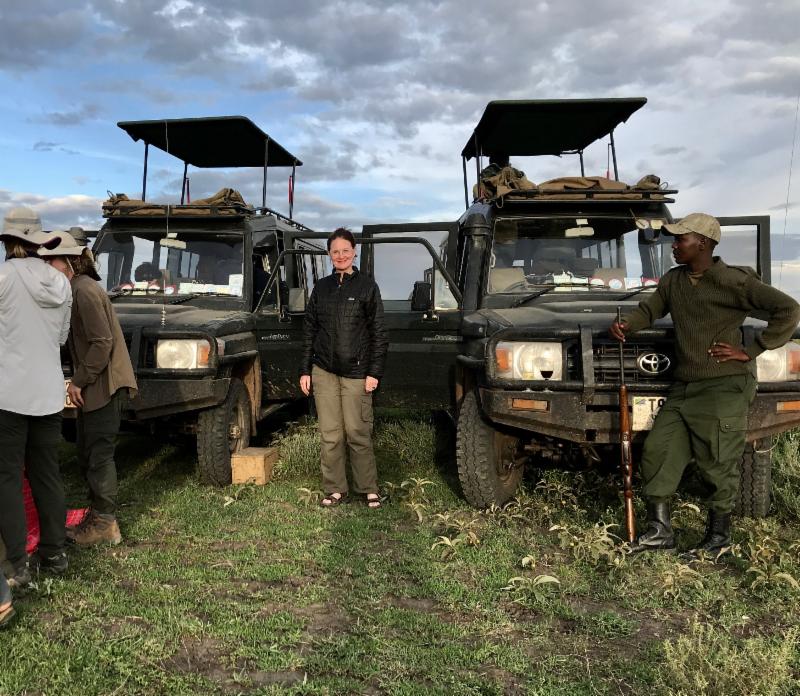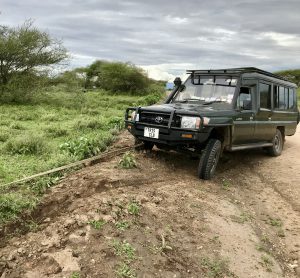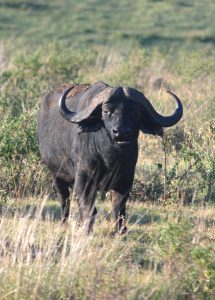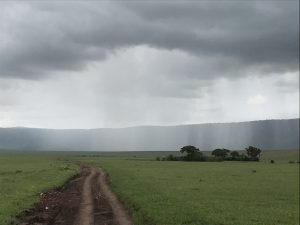
Managing the Safari Way
Managing the Safari Way
I’m just back from my third trip to Tanzania – a three-week immersion into a startlingly different land, whose people, animals, birds and weather never fail to help me see life more fully than I otherwise might. These safaris give new meaning to the word, perspective.
Safari, which literally means journey, is defined above all by its unpredictable nature. Yes, there is an itinerary – a plan, as it were – but the real adventure unfolds in ways that includes a variety of unexpected pitfalls, which need to be reckoned with in the moment. This reality got me to thinking about the surprising connections between safaris and managing organizations. Here are five such connections for you to consider as you strive to help your organization succeed…
Getting stuck in the mud
The safari situation: Eleven of us are in two Toyota Land Cruisers when a back tire on one of the trucks suddenly slides into a muddy ditch: We can’t go forward or backward. We’re completely stuck. The second truck comes over to us, unfurls a tow rope that can pull up to five thousand pounds, hooks it to our undercarriage and then, with a lurch, pulls us free from our hole, so we can safely continue on our journey.
The management situation: In business, getting stuck in the mud can show up in a number of ways. One way is when a company has been very successful. So much so, that it has come to take its success for granted and, unwittingly, has developed myopia about its own vulnerability. One day, management realizes that its seemingly indomitable market relevance is waning. In short, the company is stuck in a self-imposed, very muddy rut, unclear about how to move on. Maybe extraction will take a new CEO, or a merger or some other meta-change. Perhaps less drastic measures are possible. In any event, to avoid getting stuck in this particular kind of mud, surround yourself with well-intended skeptics, as well as avid supporters, who won’t hesitate to pull you up short, by challenging the assumptions that led to your success in the first place.
Changing a flat tire while surrounded by wild animals
The safari challenge: We’re driving down a forested road into the Ngorongoro Crater, considered by some to be the eighth wonder of the world, because of its wide range of ecosystems and virtually the whole range of safari wildlife. Suddenly, we discover we have a flat tire. We have no choice but to change it, despite the Cape Buffalo, lions, and other animals that wander free, nearby. We exit the vehicle and our guide, with some help from us, moves with surgical precision to replace the flat. It is done in minutes and we continue our trek, having avoided any encounters with the Crater’s natural residents.
The management challenge: The pace of business continues to increase, while countless decisions are made every day. Plans are formulated and executed with success in mind. Sometimes, however, companies experience “flat tires” which complicate their best-laid plans. Suppliers fail to ship on time. Product development cycles take too long. Distribution costs increase, unexpectedly. Meanwhile, the company is surrounded by hungry competitors, eager to take advantage of your unexpected misfortune. Changing the inevitable “flat’ means having a Plan B at all times. Anticipate the problem. Be agile. And be swift.
Dealing with the wind and rain
The safari challenge: We’re camping on the Serengeti. Our tents are solidly constructed and totally enclosed. Each tent has two cots, each with bedding. One night, the rains came, and came, and came. Another night, it was the wind howling outside our canvas domains. Thoughts turned to whether our tents would withstand these poundings. They did. So did we.
The management challenge: The “wind and rain” management teams face are the macro-economic conditions which are entirely out of their control. There’s nothing one can do about rising interest rates, GDP growth, or budding trade wars. The best way to deal with the wind and rain that’s part the business landscape is to make sure you’ve constructed a secure “tent” – a strategy and culture expressly designed to withstand the economic elements which won’t always be in your favor.
Traveling with no clear path in sight
The safari challenge: One of the core tenets of safaris is that you drive off-road more than you drive on-road. In fact, you often drive no-road. In the course of our three-week excursion, we spent about as much time crushing brush as we did cruising dirt paths. Forget asphalt! My point: Our driver-guides were our leaders. They saw what we could not see. They knew where we were going when we decidedly did not. And we got there.
The management challenge: Planning is the sine qua non of business. Most successful companies plan a clear course and follow it to the extent possible. The truly remarkable company is one that can follow not just a plan, but its instincts – not blindly, but based on deep experience, intuition, and one other rare ingredient: trust in the informed wisdom of its people to get the company where it needs to go.
Getting lost and finally found
The safari challenge: We’ve been driving in our trucks for most of the day, heading to a campsite where none of our guides have been before and we don’t have the GPS coordinates. It has been a long, dusty trek and it is starting to get dark as we cruise around the bush. We are clearly lost, yet our guides remain confident we’ll find our destination soon. We decide to stay put as the second truck peels off to search the area more broadly. Twenty minutes later, the second truck radios us. They’ve found the site and give us its location. Soon enough, we see the lights of our camp on the horizon. Concern turns to composure. We are nearly home.
The management challenge: There are times in every company’s life when it loses its way, maybe a little, maybe a lot. Getting lost can occur as the result of a crisis of reputation, or some unexpected physical hazard that shakes the organization to its core. It can also happen in more benign ways, like when the company reaches a generational milestone that leads people, often unwittingly, to take stock of the past while wondering about the future. In these moments, the operative question is, where are we going? “Getting found” calls for calm nerves and strategic discipline. It also calls for faith and fortitude as counterweights to the uncertainty these moments bring.
Want to manage the safari way?
1 Along with supporters, surround yourself with well-intended skeptics, who won’t hesitate to challenge the assumptions that led to your success in the first place.
2 Have a Plan B at all times. Anticipate problems. Be agile. Be swift.
3 Forge a strategy and culture expressly designed to withstand the macro-economic elements which won’t always be in your favor.
4 Trust in the informed wisdom of your people to get the company where it needs to go.
5 Remain calm at all times. Maintain strategic discipline. And hold to faith and fortitude in the face of uncertainty.
Furaha safari!




Sorry, the comment form is closed at this time.